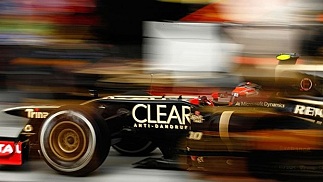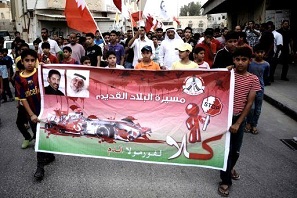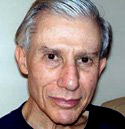Grand Prix Disgrace + Protesting for Justice in Bahrain

Romain Grosjean of France and Lotus drives in for a pitstop
during the Bahrain Formula One Grand Prix at the Bahrain
International Circuit on April 22, 2012 in Sakhir (Bahrain).
On Sunday, April 22, Bahrain's Grand Prix went on as scheduled. This year's grand prize is disgrace, not glory.
Formula 1's governing board shamed itself by not pulling out. So did participating drivers. Agreeing to race in a virtual war zone shows nothing matters but winning and money - lots of it. Going along turns a blind eye to state terror.
Mass street protests for justice don't matter. Nor do brutal security force crackdowns. London Guardian writer Richard Williams said F1's "supremo Bernie Ecclestone" has a "habit of taking the money and asking no questions."
Already a billionaire, his money lust is insatiable. Even with race day blood on the streets he wants more. So do participating drivers. Many are multi-millionaires. Passing up one stop on the circuit hardly matters. Sacrifice isn't their long suit. Neither is doing the right thing.
They turn race competition into a perversion of sport. Thanks to Ecclestone, said Williams, "a sport whose conscience was only troubled by its environmental impact now looks like a pariah."
Welcome to Bahrain. Witness two spectacles for the price of one - Grand Prix racing and security force viciousness on street protesters in one of the world's most repressive dictatorships.
One protester death was reported. Salah Abbas Habib's body was found on a Al Shakhoura rooftop. A well-known activist leader, he was arrested the previous night with others. Reportedly they were tortured. His body showed evidence of shotgun injuries and abuse.
Police tried to prevent journalists and others from seeing it. Photos revealed what they tried to suppress.
Mohammed Hassan was arrested. He tried escorting journalists to protest areas. Security forces beat him badly. Now detained, he's held incommunicado with no access to counsel or family members.
On a March 30 TV interview, he was asked why he risked speaking publicly. He replied:
"I don't care anymore. My friends have been in prison. Some are still (there), and some are in hiding, and some are dead." Whatever happens to him, he added, he accepts it. "I have no choice but to accept it."
After the interview, he was threatened. He was arrested and beaten. He also participated in a public debate. Expressing his views freely made him a marked man. Now he's dead. Responsibility points one way.
For weeks, security force violence caused many injuries. More occur daily. On April 10, Bahrain's interior minister authorized excessive force. Dozens of casualties followed. Many were from shotgun cartridge fragments directed on faces, chests, backs, abdomens, thighs, and other upper body areas.
For weeks ahead of race day, security forces raided towns and villages. Dozens of arrests followed. So did torture and other forms of abuse.
Imagine turning a blind eye and agreeing to be part of this. Writer/activist Finian Cunningham quoted a racing fan saying "(a) bunch of rich people hav(e) fun while others are being killed."
Ancient Rome scoundrels threw victims to the lions. Thousands turned out to watch. Bahrain Grand Prix racing fans aren't much different. Only spectacle watching matters, not raging state-sponsored violence on nearby streets.
On April 20, Der Spiegel interviewed Abdhulhadi Alkhawaja's daughter, Zainab. He's a longtime courageous activist barely clinging to life in prison after 74 hunger striking days.
Zainab said authorities are using the Grand Prix "to trick the world." Westerners "are supposed to believe that Bahrain is a country whose people live in peace, but we suffer under a regime that does not want to hear our screaming."
People across the country are fed up and want democratic change, she explained. "We will not keep silent, even if the Formula One is taking place. We will protest for human rights and freedom."
Calling herself a Shiite and proud of it, she added that "first and foremost (she's) a Bahraini." Her father's only crime was wanting democratic freedom. She was also arrested, held two days, interrogated, then released.
She expects much worse ahead. Thousands protest daily. Brute force confronts them. They still courageously rally for justice. "People are sick and tired of living in a country where they cannot speak about what is on their mind. I am speaking out, but we are paying a high price for it."
Race day images showed state-sponsored violence, burning vehicles and tires, rising smoke, and rubble-filled streets. Security forces and armored vehicles surrounded the race venue. Drivers are secluded from events outside.
Few comment other than discussing preparations, expectations, and hopes. Jenson Button told reporters:
"You are here interviewing me as a driver and that's exactly what I am going to talk about – motor racing. The outside issues, I'm not going to talk about."
Sebastian Vettel joked saying "I haven't seen anyone throwing bombs." He added that his job like other participants is concentrating on the sport and "nothing else."
Opposition Al Wefaq party senior member, Mattar Ebrahim, said "Formula One is being used by the government to mislead public opinion by saying that Bahrain is back to normal."
Agence France Presse reported London protests outside F1's offices. Participants want UK drivers to pull out. Rights campaigner Peter Tatchell "appeal(ed) to Lewis Hamilton and Jenson Button to withdraw from the" event. "By participating (they give) respectability to the regime."
"Shame on you, Bernie," he added. "There can be no normal sporting relations with an abnormal regime that is killing its own people."
Authorities spent millions promoting what became a spectacle of shame. Nothing going forward will change things. Damage done won't easily be erased.
On race day Sunday, London Independent writer David Tremayne headlined, "Money talks as F1 show goes on regardless," saying:
"If you closed your eyes and put everything that has happened over the past week out of your mind, it was possible to imagine that it was business" as usual.
Why race after "almost universal condemnation from human rights activists." Money matters more than morality.
Independent writer James Corrigan called "Weekend at Bernie's....beyond bad. The show must go on," he said. It never should have been scheduled in the first place, nor in other nations ruled by despots.
Bernie takes "the outrageous to a new level." He needs police protection to get through it, get out, and go home. Henceforth, he'll be remembered as the maestro of misery, oblivious to street violence outside his cloistered paddock at the Bahraini International Circuit.
Asked by reporters to comment, he said "it's a lot of nonsense. You guys love it. What we really need is an earthquake or something like that now so you can write about that."
UK Prime Minister David Cameron contemptuously avoided expressing condemnation, saying:
The event is "a matter for Formula One. Bahrain is not Syria. There is a process of reform underway."
Ed Milliiband was one of 17 MPs signing a Commons motion, calling the race "an endorsement of (Al Khalifa) policies of suppression of dissent. I certainly think it is the case that, given the violence we have seen in Bahrain and given the human rights abuses, I don't believe the Grand Prix should go ahead."
Alkhawaja's daughter told the Independent:
If drivers don't reconsider and leave, "their children will ask them why they went to race in a country when its rulers were arresting and torturing so many people."
Imagine starting their engines mindless about protesters assaulted, brutalized, and perhaps shot nearby. It gives outrage, disgrace, and contempt for what's right new meaning.
 Bahraini Shiite Muslims protest the killing of protester Salah Abbas Habib, 36, in Bilad al-Qadeema, a suburb of the capital Manama. Protesting for Justice in Bahrain Long-suffering Bahrainis want democratic change. In response, Al Khalifa security forces attack them. Washington turns a blind eye. So did Formula One's governing body. On April 22, Bahrain's Grand Prix goes on as planned. Protesters call it "blood on the track." Money, prestige, and face saving matter most. So does enforcing power through the barrel of a gun. Justice is nowhere in sight. From April 20 - 22, the February 14 Youth Coalition promised "three days of rage." Huge masses rally for justice. London's Telegraph said protesters "flooded a main highway in a march stretching for miles...." Out with the hated monarchy. Stop the hypocrisy of racing in a virtual war zone. Security forces responded as expected. Violence raged. It still does. Tear gas, rubber bullets, stun grenades, sound bombs, buckshot, and what some called toxic gas are used. On April 20, Bahrain's senior Shiite cleric, Sheik Isa Qassim, delivered a sermon denouncing Al Khalifa brutality. Ahead of Sunday's Grand Prix, he said crackdowns resembled "a war" zone. "This is a crisis of a government that does not want to acknowledge the right of people to rule themselves and choose their representatives," he added. On April 19, the US-based Physicians for Human Rights (PHR) issued a press release denouncing the "indiscriminate and systematic use of tear gas against civilian protesters and densely populated Shia neighborhoods." According to PHR's Richard Sollom, tear gas is "potentially lethal" when used against "men, women, children, and the elderly...." Long-term health consequences include miscarriages and birth defects. PHR's past president, Holly Atkinson, said: "When all eyes turn to Bahrain this weekend to watch the Formula One race, we cannot forget the protesters who are being constantly attacked by their own government." PHR expressed concern for tear gas' "suspected severe health impact on the population." It also stressed Al Khalifa hypocrisy. Despite promising long needed reforms, excessive force is used. Instead of improved conditions, they've deteriorated. In solidarity with protesters under the banner of "#OpBahrain," the Anonymous hacking group took down Formula1's web site. At least temporarily it couldn't be accessed. An accompanying message said in part: "For over one year the people of Bahrain have struggled against the oppressive regime of King Hamad bin Al Khalifa. They have been murdered in the streets, run over with vehicles, beaten, tortured, tear gassed, kidnapped by police, had their businesses vandalised by police, and have tear gas thrown in to their homes on a nightly basis." It continued saying instead of reform, crackdowns increased. F1's Grand Prix "should be strongly opposed." Its governing body knows what's ongoing but plans to race anyway. Authorities promised to use live fire to assure it. Anonymous won't be silent. "We Do Not Forgive. We Do Not Forget. Expect Us." An earlier OpBahrain press release said Anonymous launched "Operation Lightening Rod" along with "Operation Gun Shy." Both provide news on Bahrain. On April 20, London Guardian Middle East editor Ian Black headlined, "Bahrain Grand Prix revs up polarisation of Gulf state," saying: Despite demands to cancel it, King Hamad plans going ahead as scheduled. "Bahrain is gearing up for trouble as the controversial Formula One grand prix gets under way. But whatever the outcome on the track, it's a fair bet that the Gulf island state's political tensions are not going to disappear very soon." Unwanted foreign journalists were denied visas or entry permission on arrival at Manama's airport. PR spin doctors try putting a brave face on unspeakable repression and the hypocrisy of racing while it's ongoing. "Even the slickest PR cannot disguise the fact that the monarchy has failed to enact constitutional and institutional reforms to ensure a fairer division of power." On April 21, London Independent journalist Robert Fisk headlined, "This is politics not sport. If drivers can't see that, they are the pits," saying: "When the Foreign Office urges British motor racing fans to stay away from Bahrain, this ain't no sporting event, folks, it's a political one." "The Bahraini authorities prove it by welcoming sports reporters but refusing visas to other correspondents who want to tell the world what's going on in this minority-run, Saudi-dominated kingdom." What if Jews, not Shia Muslims, were being attacked, asked Fisk? F1's governing board would turn tail fast. An Independent op-ed headlined, "No credit to Bahrain or Formula One," saying: "The Formula One Grand Prix should not be happening in Bahrain this weekend. That is the long and the short of it." Officials handling security said assuring it can't be guaranteed. At issue isn't security, it's doing the right thing and condemning Al Khalifa brutality by F1 governing board and drivers canceling out and going home. Two members of the UK-based Force India team asked to leave after seeing petrol bombs burning in streets. A car carrying four team members witnessed police violence against protesters. Bob Fernley, the team's deputy principal, let two of his staff go home. They wanted no part of what's going on. Police already killed one man. His body was found near Mananma clash areas. More deaths and injuries may follow. April 22 potentially could replicate Derry, Northern Ireland's January 30, 1972 Bogside Massacre called Bloody Sunday. UK soldiers shot 26 unarmed civilian protesters and bystanders. Fourteen deaths resulted as well as injuries. Later reports said five civilians were shot in the back. The incident occurred during a nonviolent Northern Ireland Civil Rights Association march. Critics called what happened reckless. Authorities largely cleared participating soldiers of blame. The controversy still resonates today. Everyone shot was unarmed. Much too late to matter, a 2010 Saville Inquiry said killings were "unjustified and unjustifiable." In response, UK Prime Minister David Cameron made a formal apology. Lost lives won't be restored. Nor will surviving family members forgive. During Sunday's race, Bahrain authorities promised to use live fire against disruptive protesters. Blood on the streets and track may follow. In his Saturday radio address, Obama said nothing. The best from America's State Department was spokeswoman Victoria Nuland expressing administration concern about "the increase in violence in Bahrain, especially leading up to the Formula 1 race. These are unproductive, unhelpful acts...." Throughout months of state-sponsored terror, the administration's been largely silent. Comparisons with Syria are obvious, the hypocrisy glaring. Most US domestic and foreign policies disregard fundamental human and civil rights. Washington gets away with murder. So do valued allies like Bahrain. If blood flows Sunday, expect little said in response. Bahrainis are on their own. Their courage shows they won't quit. Eventually they may prevail. Maybe they'll inspire others. The so-called Arab Spring's just a slogan, not a reality. Sustained freedom fighting may make it one, and not just in Bahrain. |

Stephen Lendman: I was born in 1934 in Boston, MA. Raised in a modest middle class family, attended public schools, received a BA from Harvard University in 1956 and an MBA from the Wharton School at the University of PA in 1960 following 2 years of obligatory military service in the US Army. Spent the next 6 years as a marketing research analyst for several large US corporations before becoming part of a new small family business in 1967, remaining there until retiring at the end of 1999. Have since devoted my time and efforts to the progressive causes and organizations I support, all involved in working for a more humane and just world for all people everywhere, but especially for the most needy, disadvantaged and oppressed. My efforts since summer 2005 have included writing on a broad range of vital topics ranging from war and peace; social, economic and political equity for all; and justice for all the oppressed peoples of the world like the long-suffering people of Haiti and the Palestinians. Also co-hosting The Global Research News Hour, occasional public talks, and frequent appearances on radio and at times television. I also am a Research Associate of the Centre for Research on Globalization. I live in Chicago and can be reached at lendmanstephen@sbcglobal.net. Also visit my blog site sjlendman.blogspot.com and listen to The Lendman News Hour on RepublicBroadcasting.org Monday - Friday at 10AM US Central time for cutting-edge discussions with distinguished guests on world and national issues. All programs are archived for easy listening. My new book "How Wall Street Fleeces America: Privatized Banking, Government Collusion and Class War" can be ordered HERE.
___________________________________________________________________________________
Photo 1 (Credit: Paul Gilham/Getty Images) + Photo 2
URL: http://www.a-w-i-p.com/index.php/2012/04/23/grand-prix-disgrace
























